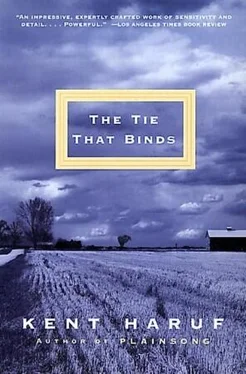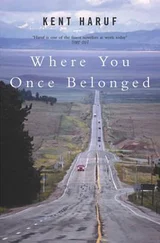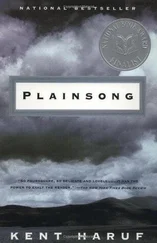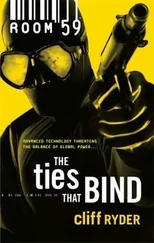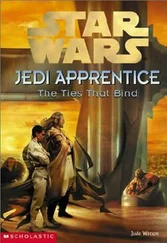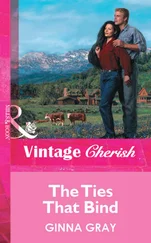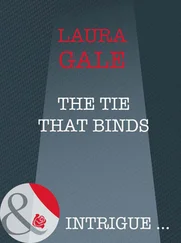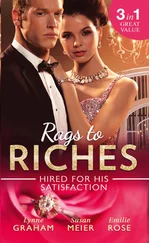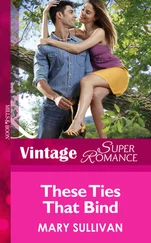I got my first solid lesson on June eleventh, I remember exactly. My dad and I were on horseback in native sandhill grass, driving cattle — maybe you noticed the tops of the hills in that pasture southeast when you drove in here. At any rate it’s a big pasture, an entire section, all grass and sagebrush and soapweed with two windmills pumping cold water into fifty-foot stock tanks. That section’s never been worked or turned under by any plow. It was part of the land my dad accumulated during those three years he was drinking hard and working harder in the middle 1920s, after Edith Goodnough decided she couldn’t leave home, that she wasn’t free enough to move even a half mile west. You ought to ride out into that grass before you leave; it might give you some idea of what this country looked like before it was chopped up and fenced into titled lots. On the other hand you may feel the way Edith’s mother felt about it. I think I told you Ada died without ever appreciating it. She didn’t like it; she still wanted Iowa. Well, she didn’t understand what she saw out here.
Because it’s damned fine if you know how to look at it. And no more so than in June after a wet spring. The spring of 1950 was wet, too. The grass my dad and I were riding through that day was thick, green, tall, spotted with wild-flowers, rich. The cattle were starting to slick up with it, to smooth and fill out again after the winter months and after dropping their calves in March, and the calves, those damn little white-faced bailies, kicking and galloping along beside their mamas, their tails riding straight up into the air like white flags, were full of frisk, for all the world innocent yet of what was waiting for them. We were driving them down to a holding pen and a work corral beside one of the water tanks. There was a good squeeze chute at one end of the corral, and we were going to run them into the chute, squeeze them immobile, and then vaccinate and brand each one and castrate the bull calves.
So I was riding one part of the pasture and Dad was riding another, both of us driving cows and calves, and the range bulls mixed in with them, the bulls tailing the cows slow and hardheaded the way they do, thick necked, their balls swinging, down toward the holding pen. It felt good to be in the sun, to sweat in the open on horseback after nine months of school, and Hammer was working the cattle all right now. He hadn’t believed at first that it was his day to work, until I had to boot him around some, ride the morning’s green out of him to set his mind right. So it was all going smooth enough, and I was trailing cattle, pushing them down easy toward the corrals, turning the calves back when they tried to run off, popping the butts of the bulls with the knot at the end of my rope. At the water tank I got them shut up behind a back gate where they would stay milling in the heavy dust, bawling and plopping shit, until we were ready to work them. But Dad wasn’t in yet, so I rode back out to help him.
My dad was beyond help.
I found his horse out there in the pasture stamping flies away and chewing bluestem grass. He trotted off when I rode up to him. Dad was fifty feet away. He was lying on his face in the sand beside a clump of soapweed. I got down and turned him over and saw his face. It wasn’t a pretty thing to see. It was all bluish, mad, shocked, his eyes were wide open. I didn’t know what to do. He was already dead, though, and I could see it hadn’t been easy. His hands were gnarled hard at his chest; clutching at his shirt, he had torn some buttons off; and there were deep wet ruts in the sand where it looked as if he had been trying to kick something away from him with his boots, like it was a snake or a rabid dog. One of his legs was still cocked to kick again.
So what was I going to do now? What in hell was I supposed to do? We were out there in that native pasture, and it was all finished by the time I found him. Finally I put his arms down at his sides and straightened his leg and brushed the sand from that white scar that Frank Lutz had given him. There was grit in his eyes too from lying on his face with his eyes open. I wiped the sand out of those brown staring eyes and then closed his eyelids. There wasn’t anything to do after that; I wanted there to be something more but there wasn’t. So I sat beside the length of his body and just cried. I didn’t even know how to cry for him; my chest and throat felt like somebody was kicking me. Then the flies found him under that June sun and I was almost glad they did. It gave me something more to do: I could fan his quiet face with my hat. And I did that for a long time, sat there and fanned him, waiting for the moment when I knew I would have enough force to move again, to gather him up and ride him home. I suppose it took a couple of hours before I felt ready.
When I got him home Doc Schmidt confirmed for me what I knew I had seen when I turned him over. My dad died of a heart attack.
It also turned out that I was right to have delayed taking him home, because in the next forty-eight hours my mother and I had some bad fights. The fights closed everything down, shut it all off. She was going to bury my dad in the town cemetery.
“No, you’re not,” I said.
“I’ve already purchased two plots from the city. You should have told me sooner.”
“I’m telling you now. You use them. Dad’s not going to.”
“He is, though.”
“No, he’s not. You don’t have the right to do that.”
“I’m his wife. That gives me the right. I put up with him for twenty-five years, Sanders.”
“Shut up,” I said. “Can’t you shut up about that?”
Her eyes went flat then. Her hands were shaking. “You think that was easy?” she said. “You do, don’t you? You think it was all my fault that I wasn’t enough for him. Well, you don’t have even the first idea what it was like. You’ve always taken his side against me, even from the very beginning you did. It was always you and your father together, and somewhere — don’t ask me how — but somewhere I was supposed to fit in.”
“You had your dresses,” I said. “Your goddamn church meetings.”
“Church?” she said. “My God, you’re stupid. You think I would have cared about the church if there was anything else?”
“Well, it’s too late now. Dad’s staying here.”
“We’ll see about that.”
“No, we won’t. It’s already decided.”
So I played the bastard with her. I admit I was a real son of a bitch about it. But I was not going to let her take him into town to that damned cramped little cemetery so that one of the boys who worked summers for the city could water and mow the grass over him and so they could mount plastic tulips beside his grave on Memorial Day. And in the end I had my way about it. I told John Baker, the mortician, to prepare my dad for a funeral out here in the country. He could shave him and dress him up in a suit if that would please my mother, but I didn’t want any powder or rouge smeared on his face to make him look alive. He was dead. Let him be dead. He wasn’t to go out looking like some wax manikin.
The funeral was on June fourteenth, in the heat of a clear morning. The whole country showed up — people like Charlie Best and Frank Lutz and Agnes Wilson and Wenzel Gerdts and Ellis Burns and Leon Shields and even old Ludi Pfeister from Kansas with his canes, who were all my dad’s friends, and others too, my mother’s friends from church. Edith Goodnough was also there. We walked up to that rise, past the corrals and beyond the horse barn, to the just-dug hole beside the old grave that was sunk past ground level, my grandmother’s grave. When we were assembled the minister spoke to us, told us about a man he himself didn’t know much about, while my dad’s friends who did know him stood unhatted in the sun and wiped away the sweat that trickled down their white foreheads. Up close to the grave we were in the shade of that big cottonwood and it was cooler.
Читать дальше
